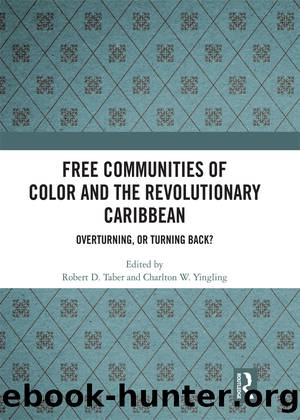Free Communities of Color and the Revolutionary Caribbean by Robert D. Taber Charlton W. Yingling

Author:Robert D. Taber, Charlton W. Yingling [Robert D. Taber, Charlton W. Yingling]
Language: eng
Format: epub
ISBN: 9781351168984
Barnesnoble:
Publisher: Taylor & Francis
Published: 2020-01-24T00:00:00+00:00
The defeat of the French equalled an end to colonialism and slavery and all the prejudices and divisions those institutions spawned.
Vasteyâs narrative offers a triumphant ending with the erasure of all social divisions; yet, another racial label, nègre marron, illustrates how the legacy of colonialism and slavery haunt Haiti after 1804 and disavow the contributions of the black majority. Vastey contended that the French used the label fugitive slave ânègre marronâ to degrade Haitians. For example, in reference to French negotiations, he declared that the French gave a free people âthe epithets of evil savage and fugitive slave.â28 The label of maroon or fugitive slave belittled Haitiansâ status as people free from slavery and colonial rule. The term also signified lawlessness, the absence of civilization and government. Maroons were an external insult by the French to define Haitians as inferior but also an internal threat to Christopheâs centralized state and economy. Literary scholar J. Michael Dash states, â[Vasteyâs] ideal, like that of his King, was that of a scientifically advanced modern state not the creation of a maroon culture based on the African village.â29 The Code Henry, which Vastey helped write, laid out labor rules and punishment for vagrancy, marronage by another name. The vagrants for Vastey and Christophe were the black majority, former slaves who did not share in the éliteâs economic vision of continuing sugar production. Thus, for Vastey the label maroon held no patriotic meaning; rather it was a term given to vagabonds who threatened the functioning of the state, and, by extension, the maintenance of independence. This rhetoric placed the black majority at best in need of âcivilizingâ and at worst outside of the national community conceived of by intellectuals and the state.
Download
This site does not store any files on its server. We only index and link to content provided by other sites. Please contact the content providers to delete copyright contents if any and email us, we'll remove relevant links or contents immediately.
Cat's cradle by Kurt Vonnegut(15338)
Pimp by Iceberg Slim(14488)
4 3 2 1: A Novel by Paul Auster(12375)
Underground: A Human History of the Worlds Beneath Our Feet by Will Hunt(12090)
The Radium Girls by Kate Moore(12018)
Wiseguy by Nicholas Pileggi(5770)
The Fire Next Time by James Baldwin(5431)
Perfect Rhythm by Jae(5398)
American History Stories, Volume III (Yesterday's Classics) by Pratt Mara L(5301)
Paper Towns by Green John(5179)
Pale Blue Dot by Carl Sagan(4996)
A Higher Loyalty: Truth, Lies, and Leadership by James Comey(4954)
The Mayflower and the Pilgrims' New World by Nathaniel Philbrick(4495)
The Doomsday Machine by Daniel Ellsberg(4484)
Killers of the Flower Moon: The Osage Murders and the Birth of the FBI by David Grann(4435)
The Sympathizer by Viet Thanh Nguyen(4385)
Too Much and Not the Mood by Durga Chew-Bose(4338)
The Borden Murders by Sarah Miller(4313)
Sticky Fingers by Joe Hagan(4188)
